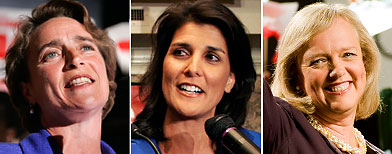 If there's one political lesson from Tuesday's primary results, it's this: When voters become disenchanted with the political system, insiders do best by impersonating outsiders.
If there's one political lesson from Tuesday's primary results, it's this: When voters become disenchanted with the political system, insiders do best by impersonating outsiders.In Arkansas, embattled Democratic Sen. Blanche Lincoln narrowly captured her party's nomination by positioning herself as an underdog fighting for her political life against big-money influence from Washington.
In South Carolina, Nikki Haley made it to a June 22 runoff in the state's GOP gubernatorial primary by running as a tea party insurgent, in spite of her close ties to incumbent Republican Gov. Mark Sanford.
And in California, two establishment candidates, Meg Whitman in the GOP gubernatorial race and Carly Fiorina in the GOP Senate race, won their respective nominations by running as fresh-faced outsiders willing to challenge the status quo, even though both women are very rich, self-financed former corporate executives.
Yet as analysts begin to assess the biggest day of voting thus far in the 2010 race, the question of how voters feel heading into November was as muddled as ever.
In Nevada, tea party favorite Sharron Angle defeated the onetime frontrunner in the race, former state GOP chair Sue Lowden, by double digits — a major victory for Senate Majority Leader Harry Reid, who has his best shot of winning re-election against Angle. But was Angle's victory more reflective of the tea party movement or Lowden's owncampaign missteps? In the final month of the campaign, Lowden wounded her own campaign by suggesting live chickens could be bartered in exchange for medical care — a claim endlessly mocked by Democrats and press commentators — and her campaign never recovered.
Still, the tea party's influence in the race cannot be underestimated. In the final hours of the campaign, both Lowden and third-place finisherDanny Tarkanian tried to swing votes their way by trumpeting talk-show host Glenn Beck's doubts about Angle's electability this November. Yet tonight's results also call into question how big a movement the tea party really is. While Angle and Haley, another tea party favorite, sailed to victory, a trio of party-backed candidates in Virginia House races easily fought off tea party challengers.
In any case, one political theme is clearly unchanged: the influence ofmoney. In California, Whitman spent more than $70 million of her own to win the primary, setting new records in a state well known for its expensive campaigns. California also approved Prop. 14, a voter initiative instituting an open-primary system that would pit the two top vote-getters in a primary automatically in a runoff-style generalelection. The measure was pitched as a way to steer candidates into the political center, but opponents of the initiative claim that it will onlyfortify big-money candidacies in the state.
Finally, Whitman played into a theme that, as we noted earlier, might have legs this November: the rise of GOP women. Women dominated nearly all the big Republican races tonight — Haley in South Carolina, Fiorina and Whitman in California, and Angle in Nevada. Blanche Lincoln, who was first elected to the House in the historic 1992 "Year of the Woman" wave that principally benefited Democratic candidates, probably couldn't have imagined a similar trend taking shape on the GOP side of the aisle when she first came to Washington. But back then, Lincoln really was an outsider.
No comments:
Post a Comment